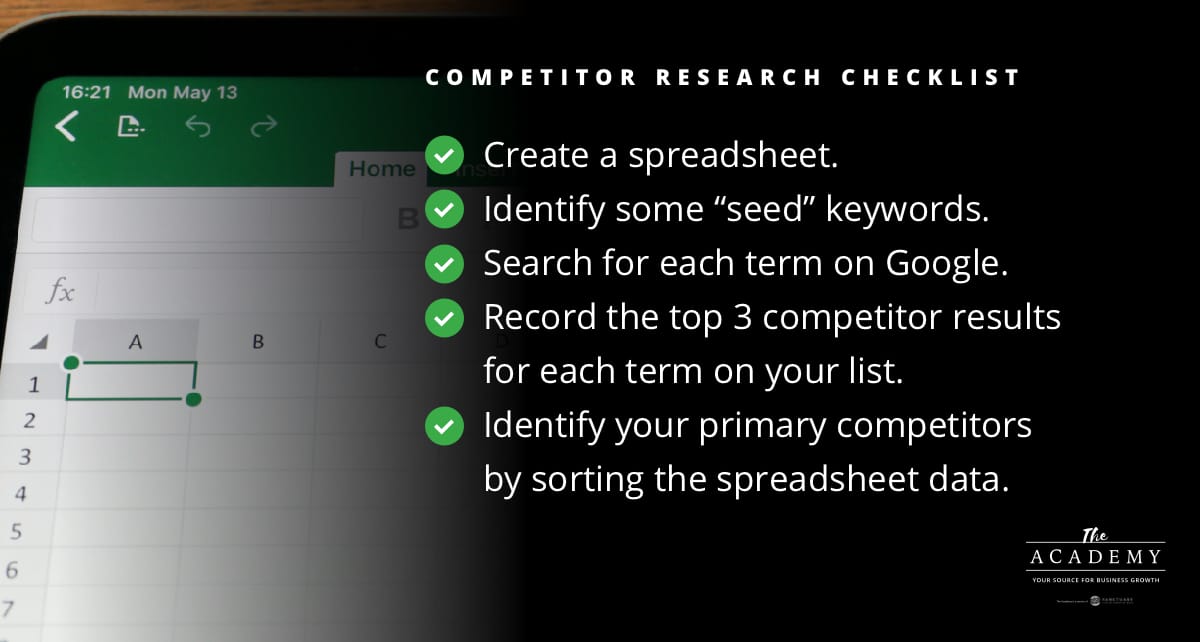
Keywords are at the heart of search engine optimization. If you are trying to execute any kind of SEO strategy on your website, you’ll surely be paying close attention to the keywords that you are targeting on your pages. By managing to find keywords that are both relevant to your niche and attainable in terms of ranking on page one, you may be able to secure additional visits to your site month after month.
Anyone who has played the SEO game for long knows just how difficult it can be. There is tons of competition out there and it’s rarely as easy as just putting some keywords up on your pages and then waiting for the traffic to roll in. You need to be as strategic as possible in your execution.
Keyword competitor analysis is an important tactic in your overall strategy to beat out the competition in terms of search rankings and organic traffic.
Learn from Your Competition
When you step back and see the bigger picture, there is nothing particularly new about the idea of learning from your competition in business. This is how businesses have operated for decades – or even centuries – and it isn’t going to change anytime soon. As long as there is competition in the marketplace, businesses will be trying to take ideas from others in their market, so they can keep up or get ahead.
Getting back to the topic at hand, competitor keyword analysis is simply the process of learning what keywords are working for your competition, so you can target them for your business. Even if you have done thorough keyword research on your own, it’s virtually inevitable that you have missed some good opportunities along the way. By taking the time to figure out what your competition is targeting, you can then add those keywords to your list and get to work on trying to rank as high as possible in the search results.
Ultimately, the goal here is to find keywords that can not only bring you traffic, but traffic that is likely to convert once it lands on your site. In other words, you want high-quality traffic, rather than focusing only on volume. The reason it’s so helpful to use your competition as a resource is that they have probably seen how these keywords are working and have continued to pursue them actively through content marketing and other methods – meaning they likely have seen some good results from the traffic that comes in. Even if you don’t wind up taking the top spot for any of these competitor keywords, moving up somewhere into page one could be a big boost.

Identifying Your Best Competitors
At the risk of stating the obvious, you can’t track down your competitor’s keywords until you know who those competitors are within your niche. While there are probably many different businesses that could be considered your competitors, consider getting started by identifying the top three. Once you know who those top three are in your space in terms of digital marketing, you can then move on to the next steps of this process.
To make sure you pick out the right sites to use for research, try out the process below:
- Start by making a quick spreadsheet for this research project – you won’t be keeping this sheet for long, so it doesn’t need to be anything fancy.
- In the left-hand column, enter the most obvious search terms that relate to your niche. Aim for at least ten, but more is okay, as well. You shouldn’t have to do keyword research to build this list, as these keywords should be the main search terms that would be used to find your products or services.
- Now, head over to Google and perform a search for each of these terms. When the results come up, record the top three results in your spreadsheet, in the cells to the right of each search term you listed.
- Once you have gone through the whole list of keywords and recorded the results, you can count up how many times each business appears in your research.
The businesses that appear most frequently near the top of the search results for these important terms are almost certain to be your primary competition from a digital marketing standpoint. These are sites that know what they are doing from an SEO perspective, and they have likely put a lot of time into the task of moving up the rankings for such big searches. Use these sites as you move forward with competitor keyword research to figure out what other terms they are targeting and which of those might be a good choice for your efforts.

Putting Competitor Research Tools to Work
You aren’t going to be able to simply look over the pages of your competition and pick out the keywords they are having success targeting. Well, you could try, but that method wouldn’t be very effective – and even if it did work, it would take forever. So to really make this strategy pay off, you are going to need to employ a few strategic tools.
Google Search Console and Google Analytics
First, you’ll want to have the basic Google tools installed and up and running on your site for some time. You probably already have these in place, but in case you don’t, work on getting Google Search Console and Google Analytics 4 in place right away. These aren’t going to tell you anything about your competitor’s sites, but they will provide information about your own site that will be important for comparisons later on.
Paid SEO Tool
The other piece you’ll need here is a paid SEO tool that you can use to do the heavy lifting in the research process. These tools can be a little pricey, but you don’t have to maintain a monthly membership forever (unless you find it valuable to keep and continue using). Some of the most popular options on the market today include Ahrefs, SEMRush, and Moz Pro, but there are many others.
When picking out the tool you are going to use, make sure it offers some kind of website explorer or audit function where you can enter a URL and be provided with a list of the top-ranking keywords on that site. Most of the tools provide this service but check the details before you subscribe. This is going to be the fastest way to figure out what keywords are delivering value to your competition and you will be a big step closer to being able to leverage this information for your site’s benefit.

Select Keywords and Make Your Move
So, once you use an SEO tool to identify the top keywords on your competitor’s sites, you just take the keywords from the top of that list and get started – right? Not so fast. There is still plenty of work to be done before you can figure out which keywords you are going to use for a round of content creation and SEO work.
With a list of keywords from your competing sites, you’ll need to compare that list to a list of the pages that you rank for already. After all, it doesn’t do any good to pull out keywords from the list that you already target – what we are looking for here are new opportunities. Cross-reference the lists and find spots where a good keyword exists and is not yet represented in any meaningful way on your site.
A bit of handy work with a spreadsheet should leave you in a pretty good position as far as sorting out which keywords are duplicates and which are fresh opportunities for you to explore. Then it’s time to go through a vetting process for those keywords to decide which ones are worthwhile to put time and effort into. You may already have your own criteria for qualifying a keyword as one you want to invest in, but here are some points to keep in mind:

- Sufficient volume. You probably don’t want to put much time or effort into ranking for keywords that get very little search traffic – unless it’s an important niche for you. Ranking in the top spot might feel good, but it won’t move the bottom line if only a few people per month are rolling in via that search (with the exception of particularly high-ticket offers, where even a few qualified visitors a month could make a big difference). Every business has its own threshold for how many searches per month make a term worthwhile, so you’ll need to compare this list to others you have compiled in the past. Remember that most SEO tools tend to moderately underestimate how many times most terms are searched, so the actual volume may be higher than what you are seeing.
- A chance to win. Another point of concern is seeing heavyweight competition at the top of the search results for some of these keywords. Be honest in your evaluation; If the top of the SERPs is dominated by sites that are much larger and more authoritative than your own, there is probably no chance of ranking highly at this time. You might want to store some of these high-competition keywords away for later and revisit them once your site has grown in stature.
- Relevant to your goals. Most of the keywords you come up with here will probably be relevant to what you want to accomplish with your site and business, since you mined them from the sites of your competitors. However, no two businesses are identical, so even your direct competition might target a slightly different audience than what you do. For that reason, don’t blindly follow along with every keyword on the list, but rather, take some time to think about any keyword you may target to determine if it is really a good fit for your brand.
As you can see, the concept of competitor keyword analysis is not particularly complicated, but the execution of this strategy does take plenty of effort and attention to detail. Good luck!
Most Popular Articles

Seeing Favicons in Your Google Search Results? Here’s Why…
Have you noticed anything different in your Google Search results lately? Google added tiny favicon icons to its organic search results in January. It was…

Business Growth and Digital Marketing News & Tips 11-17-24
Are you encouraging and rewarding innovation? Lee Cockerell is the former Executive Vice President of Operations at Walt Disney World. A lover of traditional red…

Business Growth and Digital Marketing News & Tips 11-27-24
A culture of gratitude "Feeling gratitude and not expressing it is like wrapping a present and not giving it." – William Arthur Ward Beyond being…








